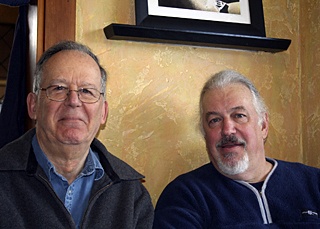Eastsound’s new sewer commissioners say that protecting Orcas Island’s aquifer is the most important task ahead of them.
“We have very serious potential problems with failed septic systems polluting aquifer,” Carl Yurdin said. “This will need to be addressed sooner or later. We’re trying to mitigate the costs for people who can’t afford to hook up to the sewer system.”
Yurdin and Rollie Sauer are the new Eastsound Sewer and Water District Commissioners, bringing the board members from three to five.
Sauer says he has two passions: affordable housing and water. He was on the Housing Bank Commission for several years, and when his term expired last month, he decided to devote his time to water issues.
“Both Carl and I were involved in the annexation of Rosario Water to Eastsound Sewer and Water,” Sauer said. “We wanted the board to have representation from that area, so we applied.”
Yurdin has lived on Orcas for four years and Sauer has been here for six.
After voting on expanding its commission, ESWD placed ads looking for prospective commissioners. Yurdin will serve through November, after which he must seek re-election to the board; Sauer seeks re-election in 2011. corporate district bounardies vote
Top on their to-do list is solving the problem of elevated nitrate levels in Eastound wells. Recent studies by the Eastsound Water Users Association, San Juan County, and the sewer district show nitrate contamination in the Blanchard area. It has been recommended that homeowners in the affected neighborhoods hook up to the sewer district – at a price tag between between $8,000 and $12,000.
“It doesn’t matter where it’s coming from – it will eventually come from everywhere,” Yurdin said of the contamination. “This isn’t a problem unique to Orcas. It happens across the world. The basic issue is simple: people have to be hooked up to the sewer where they can.”
Sauer says the sewer district is limited by the Urban Growth Area because it can’t service homes outside of the boundary.
“There are many problematic septic systems outside the UGA. But the aquifer doesn’t recognize UGA boundaries,” Sauer said.
Yurdin says the district is looking at solutions for this “governmental, political, and health problem.”
“The end result is that by doing nothing we are contaminating wells that will eventually have to be shut down,” Yurdin said. “And nobody wants that.”



